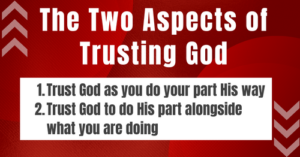Esther • Trusting God to Work in the Background

AI was not used to generate this post.
What has God placed on your heart to do for others? Is it raising children to know and love Him and choose to follow Him as adults? Is it managing people or a project at work? Is it serving in a local ministry with teens or special needs or homeless people? Whatever it is, you can trust God to lead you to do things His way. In the last blog, we looked at Zechariah chapters 9-14 and saw God’s promise to send us a king who will have power and purpose. This is post #7 in the Ezra to Malachi blog series and post #12 in the Fear to Faith blog series. In this post, we will look at the book of Esther and see how she and her cousin Mordecai trusted God to work in the background on their behalf.
Key Takeaways
- Esther trusted God in challenging times, choosing to act courageously despite the dangers she faced.
- She demonstrated two key aspects of trusting God: doing her part and trusting God to handle what she couldn’t control.
- Esther’s obedience positioned her to save her people, showcasing how God worked behind the scenes for His purposes.
- Even when facing opposition, Esther remained faithful and relied on God, illustrating the importance of prayer and dependence on God.
- Ultimately, God honored Esther’s trust and actions, leading to the salvation of the Jews and demonstrating His sovereign plan.
Listen to this post as a similar podcast from our Identity: Sticking to Your Faith in a Pull-Apart World Bible Study covering the last 7 written books of the Old Testament.
Trusting God Leads to Courage
A significant group of Jews returned to their homeland after the seventy years of exile ended. But most Jews remained spread throughout the Persian Empire. So when the story of Esther and Mordecai happened, there were large Jewish populations apart from those in Israel.
Esther’s family was one of those who chose to stay in Persia rather than trek back home. Her story began around 35 years after the temple in Jerusalem was completed. King Darius died. His son Xerxes became king. We know from history that Xerxes had a bad temper and made rash decisions which affected the lives of innocent people. That is evident in the book of Esther as well. Courage is needed to stand up to someone like that. God gave courage to both Esther and her cousin Mordecai as they practiced the two aspects of trusting God.
Fear is a normal human emotion designed by God to alert us to danger so that we will take action against it.
When we are faced with difficult situations or even decisions to make, we must trust God in two ways that we have talked about in previous blogs. This is taking action against the danger so as not to be overcome by fear.
1) You must trust God as you step forward and do your part His way.
2) You must trust God to do His part in the areas over which you have no control.

Those two aspects of trusting God are necessary to act on whatever God has placed in your path. Esther’s story provides a beautiful illustration of this for us.
Being Taken Captive
The king’s edict
It started with King Xerxes being angry with his queen. So, he ordered the search for another woman to take her place. The result was that Esther was forcibly taken out of her home and put into the king’s harem. Esther chapter 2 says this,
When the king’s order and edict had been proclaimed, many young women were brought to the citadel of Susa and put under the care of Hegai. Esther also was taken to the king’s palace and entrusted to Hegai, who had charge of the harem. (Esther 2:8)
The harem system was and still is a horrible system. Once taken into it, Esther would never be released to have a normal family life. In essence, after [the virgins] had been violated, they became slaves and virtual widows.
Esther’s choices
When Esther was taken, she had some choices to make that involved trusting God. She could obey the king’s order and be the best woman she could be in her situation. Or she could consider herself a victim and be miserable. Esther chose to do her part God’s way by being the best woman she could be, honoring how Mordecai had raised her. She had a wise heart like Abigail. This is what Esther chapter 2 says,
But Esther had kept secret her family background and nationality just as Mordecai had told her to do, for she continued to follow Mordecai’s instructions as she had done when he was bringing her up. (Esther 2:20)
Esther’s parents died so her cousin Mordecai raised her. Esther learned obedience to God-given authority at a young age. This is especially difficult for attractive or talented people to do. But learning obedience prepared her to partner with God and trust Him.
God’s work in the background
Esther won the favor and approval of the king to become his new queen. Her presence in the palace also helped to save the king’s life.
But Mordecai found out about the plot [to kill the king] and told Queen Esther, who in turn reported it to the king, giving credit to Mordecai. (Esther 2:22)
Esther did her part God’s way even in the midst of her unfair situation. God did His part by having the king choose her to be his queen. And God worked on the king so that he trusted Esther. God had a plan to use Esther again for His purposes.
The Challenge Made Known
Four years later, Mordecai sent some not-so-good news to Esther. Esther chapter 3 says this,
Dispatches were sent by couriers to all the king’s provinces with the order to destroy, kill and annihilate all the Jews—young and old, women and children—on a single day, the thirteenth day of the twelfth month, the month of Adar, and to plunder their goods. (Esther 3:13)
All the Jews would be killed in eleven months. Her life would not likely be spared. Esther hesitated to approach the king on her own because she knew it was dangerous to do so without being invited. Then, Mordecai challenged her with these words…
“Do not think that because you are in the king’s house you alone of all the Jews will escape. For if you remain silent at this time, relief and deliverance for the Jews will arise from another place, but you and your father’s family will perish. And who knows but that you have come to your royal position for such a time as this?” (Esther 4:12-14)
Mordecai believed that God would deliver the Jews somehow. But he also believed that Esther was in the God-chosen place to do something about the peril facing herself, her family, and her people.
Esther Responded God’s Way
Esther responded by doing her part God’s way.
Dependence on God
Then Esther sent this reply to Mordecai: “Go, gather together all the Jews who are in Susa, and fast for me. Do not eat or drink for three days, night or day. I and my attendants will fast as you do. When this is done, I will go to the king, even though it is against the law. And if I perish, I perish.” (Esther 4:15-16)
First, she called for all Jews including herself to fast for three days. For the Jewish people, fasting was always accompanied by prayer to God. I read this interesting quote about fasting from one of my favorite Bible teachers Wayne Braudrick:
Fasting does not please God to force Him to move His hand to do what we ask (as in paganism). We fast so we will be starving hungry to remind ourselves how incredibly weak we are and then partner that fast with prayer enjoining the presence of God who is ultimately in charge. (Wayne Braudrick, “A Woman of Courage,” sermon on November 15, 2015)
So when Esther called for other Jews to fast, she was asking them to join her in prayer about what she could and should do. She was ready to obey God as her authority as she had obeyed Mordecai all her life.
Partnering with God
Then, Esther stated she would go to the king. She needed God’s guidance as she approached the king of Persia about this threat to her people. Whatever happened was in God’s hands. She was willing to take the consequences.
Esther needed God to be with her as she did her part, which was to speak to the king. She needed God to do His part in directing the heart and mind of the king to receive her. Those are the two aspects of trusting God.
Learning to live dependently on our God is not a matter of doing whatever you can while trusting the rest to God. No. When God places something in your heart to do, especially when it involves someone else and situations over which you have no control, you must trust God to lead you in what you choose to do. You want to do your part His way, not your own way or the world’s way. That is very important.
It is so easy to take an acceptable cultural practice and adapt it to whatever you are facing. Just because others are doing something and it seems to work does not mean it is the right thing for you to do as a child of God. We can know how to act according to God’s way through His Word. He shows us how to do what is right.
Esther Acted God’s Way
After that time of fasting and prayer, Esther knew the time had come to act. Esther chapter 5 begins this way…
On the third day Esther put on her royal robes and stood in the inner court of the palace, in front of the king’s hall. The king was sitting on his royal throne in the hall, facing the entrance. When he saw Queen Esther standing in the court, he was pleased with her and held out to her the gold scepter that was in his hand. So Esther approached and touched the tip of the scepter. (Esther 5:1-2)
Trusting God, Esther did her part by approaching the king the right way, making sure he could see her, and waiting for his response. She did not force herself into the king’s presence, demanding his attention. No, she did her part the way God would want her to show respect for her husband, the king.
God took care of His part by directing the king’s heart and mind to be favorable to Esther’s presence and her request. King Xerxes invited her into the chamber and asked what she wanted from him.
Esther’s part was to invite the king and Haman to a banquet. God worked through the king to grant Esther’s request and accept her invitation. Those are the two aspects of trusting God.
Opposition Tested Esther’s Trust
Completely trusting God and doing things God’s way do not always stop the opposition. Esther’s invitation included Haman—the enemy, the one who initiated the attack on the Jews. That did not discourage Esther from doing what God had placed in her heart to do. She knew she would be in the presence of someone who hated her people and would have hated her if he knew she was Jewish.
During the second banquet, Haman pleaded with her to spare his life in a very familiar manner (Esther 7:7-8). This threatened her position with her husband, the king. God did not make it easy for Esther to do what He called her to do. Yet, she did her part God’s way while trusting that God would do His part in making the king respond favorably to her request to save her people.
Learning to live dependently on your God does not guarantee that He will stop the opposition against you. Yes, He places that desire in your heart. He wants you to be obedient in carrying it out. But He does not necessarily make it easy. Why is that? After all, you could get the task or the service done more quickly without the delays and derision. Why doesn’t God stop the opposition? Paul learned the answer to this and wrote about it in 2 Corinthians chapter 1 verse 9.
But this happened that we might not rely on ourselves but on God, who raises the dead. (2 Corinthians 1:9)
This happened (suffering, hardship, opposition, whatever it is) so we will learn to rely on God more than on ourselves. That does not mean we are to sit back and do nothing while waiting for God to do everything. Although, sometimes we need to pray and wait for the right moment to act as Esther did. That is still trusting Him while we are doing our part—waiting and praying, asking for guidance. We will see this at the beginning of Nehemiah too. We can know that He is working on His part—whatever that situation requires. Those are the two aspects of trusting God.
God Avenged the Wrong Done to Mordecai
Haman hated Mordecai and was planning to have him executed. But God would take care of that too.
At the first banquet, I believe that God inspired Esther to ask them both to come to a second banquet the next day. God had something planned for that night after the first banquet.
That night the king could not sleep; so he ordered the book of the chronicles, the record of his reign, to be brought in and read to him. It was found recorded there that Mordecai had exposed … two of the king’s officers who guarded the doorway, who had conspired to assassinate King Xerxes. (Esther 6:1-2)
The king just happened to not be able to sleep? Of all the records in the king’s chronicles, Mordecai’s heroism just happened to be read to the king? Nothing just happened. That is a work of God in the background, not a coincidence.
The king chose to honor Mordecai.
“Go at once,” the king commanded Haman. “Get the robe and the horse and do just as you have suggested for Mordecai the Jew, who sits at the king’s gate. Do not neglect anything you have recommended.” (Esther 6:10)
With a twist of irony, God made Haman honor Mordecai publicly. Everyone knew Mordecai was a Jew so this gave honor to God as well.
The king continued to trust Esther and Mordecai, allowing them to draft whatever was needed to overcome the edict to kill the Jews. The Jews were saved, and the people were united in a celebration of joy.
The Two Aspects of Trusting God
What has God placed on your heart to do for others?
- Is it raising children to know and love Him and choose to follow Him as adults? Trust Him to lead you to follow godly child-rearing principles and actions while trusting Him to work in the hearts of your children.
- Is it managing people or a project at work? Trust God to lead you to act with honesty and integrity among your fellow employees and managers while trusting Him to work in the hearts of those around you.
- Is it serving in a local ministry with teens or special needs or homeless people? Whatever it is, trust God to lead you to speak and act with compassion while trusting Him to work to meet the needs of those you are serving.
God did not make it easy for Esther to stand up for her people. Likewise, you may find yourself in situations that seem beyond your ability to handle or control. Perhaps you have an enemy (or your husband or closest friend may have one). God may not choose to rescue you from that opposition.
But God is stronger than your enemies. You can take action by responding God’s way. And you can trust Him to do His part alongside what you are doing. Celebrate the victories!
Let Jesus satisfy your heart with complete trust in Him so that you will follow His way of living life instead of the world’s way or your own way.
Read all the articles in our Old Testament Women series. In the next blog, we will look at the life of Ezra and see why it is better to follow God’s way rather than your own way of living life.
All of the above information is covered in Identity Bible Study covering Ezra, Nehemiah, Esther, Daniel, Haggai, Zechariah, and Malachi. It is also covered in the Everyday Women Bible Study covering Old Testament women.
-
Identity (Ezra, Nehemiah, Esther, Daniel, Haggai, Zechariah, & Malachi)—paperback
$16.00 -
Identity (Ezra, Nehemiah, Esther, Daniel, Haggai, Zechariah, & Malachi)—printable / fillable
$10.00 -
Identity (Ezra, Nehemiah, Esther, Daniel, Haggai, Zechariah, & Malachi)—digital reader version
$4.99 -
Everyday Women, Ever-Faithful God (Old Testament Women)—paperback
$16.00 -
Everyday Women (Old Testament Women)—printable / fillable
$10.00 -
Everyday Women, Ever-Faithful God (Old Testament Women)—digital reader version
$4.99
Image credit: sourced from a template at canva.com.
AI was not used to generate this post.





